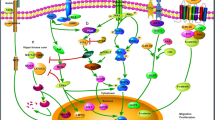Abstract
The endotoxin level in the portal and peripheral veins of hepatocellular carcinoma (HCC) patients is higher and lipopolysaccharide (LPS), has been reported to inhibit tumor growth. However, in this study, we found that LPS-induced Toll-like receptor 4 (TLR4) signaling was involved in tumor invasion and the molecular mechanism was investigated. The HCC cells were used to study the invasion ability of LPS-induced HCC cells and the epithelial–mesenchymal transition (EMT) in vitro. The in vitro experiments demonstrated that LPS could significantly enhance the invasive potential and induce EMT in HCC cells with TLR4 dependent. Further studies showed that LPS could directly activate JNK/MAPK signaling through TLR4 in HCC cells. Interestingly, blocking JNK/MAPK signaling significantly inhibited EMT occurrence. Our results indicate that TLR4/JNK/MAPK signaling is required for LPS-induced EMT, tumor cell invasion and metastasis, which provide molecular insights for LPS-related pathogenesis and a basis for developing new strategies against metastasis in HCC.





Similar content being viewed by others
References
Jemal A, Bray F, Center MM, et al. Global cancer statistics. CA Cancer J Clin. 2011;61:69–90.
Chen JG, Zhang SW. Liver cancer epidemic in China: past, present and future. Semin Cancer Biol. 2011;21:59–69.
Lee TK, Poon RT, Yuen AP, et al. Twist overexpression correlates with hepatocellular carcinoma metastasis through induction of epithelial–mesenchymal transition. Clin Cancer Res. 2006;12:5369–76.
Gao Q, Zhao YJ, Wang XY, et al. CXCR6 upregulation contributes to a proinflammatory tumor microenvironment that drives metastasis and poor patient outcomes in hepatocellular carcinoma. Cancer Res. 2012;72:3546–56.
Rakoff-Nahoum S, Medzhitov R. Toll-like receptors and cancer. Nat Rev Cancer. 2009;9(1):57–63.
Krishnan J, Selvarajoo K, Tsuchiya M, et al. Toll-like receptor signal transduction. Exp Mol Med. 2007;39(4):421–38.
Nakagawa H, Maeda S. Molecular mechanisms of liver injury and hepatocarcinogenesis: focusing on the role of stress-activated MAPK. Pathol Res Int. 2012;172894.
Oyanagi J, Ogawa T, Sato H, et al. Epithelial–mesenchymal transition stimulates human cancer cells to extend microtubule-based invasive protrusions and suppresses cell growth in collagen gel. PLoS One. 2012;7:e53209.
Araki K, Shimura T, Suzuki H, et al. E/N-cadherin switch mediates cancer progression via TGF-β-induced epithelial-to-mesenchymal transition in extrahepatic cholangiocarcinoma. Br J Cancer. 2011;105(12):1885–93.
Shuman Moss LA, Jensen-Taubman S, et al. Matrix metalloproteinases: changing roles in tumor progression and metastasis. Am J Pathol. 2012;181:1895–9.
Thiery JP, Acloque H, Huang RY, et al. Epithelial–mesenchymal transitions in development and disease. Cell. 2009;139:871–90.
Jung JW, Hwang SY, Hwang JS, et al. Ionising radiation induces changes associated with epithelial–mesenchymal transdifferentiation and increased cell motility of A549 lung epithelial cells. Eur J Cancer. 2007;43:1214–24.
Lawrence MC, Jivan A, Shao C, Duan L, et al. The roles of MAPKs in disease. Cell Res. 2008;18(4):436–42.
Maeda S. NF-κB, JNK, and TLR signaling pathways in hepatocarcinogenesis. Gastroenterol Res Pract. 2010;2010:367694.
Acknowledgments
This study was supported by the National Natural Science Foundation of China (No. 81071955) and the Scientific Research from Educational Department of Liaoning Province, China (No. L2010634)
Conflicts of interest
None
Author information
Authors and Affiliations
Corresponding author
Rights and permissions
About this article
Cite this article
Li, H., Li, Y., Liu, D. et al. LPS promotes epithelial–mesenchymal transition and activation of TLR4/JNK signaling. Tumor Biol. 35, 10429–10435 (2014). https://doi.org/10.1007/s13277-014-2347-5
Received:
Accepted:
Published:
Issue Date:
DOI: https://doi.org/10.1007/s13277-014-2347-5




